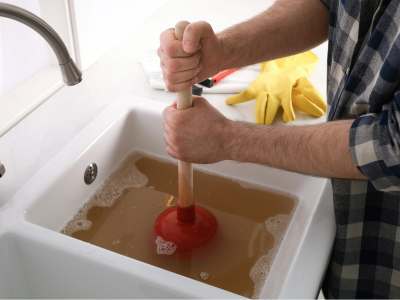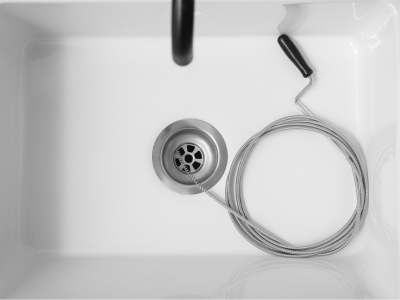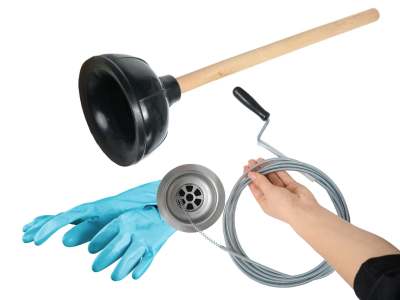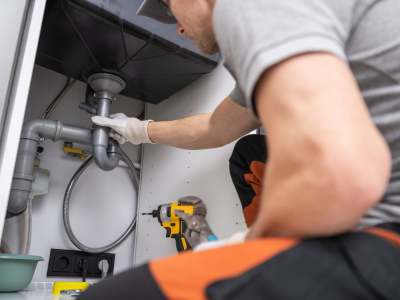A clogged kitchen sink can bring your entire household to a standstill. Suddenly, cooking becomes stressful, washing dishes is impossible, and the foul odor creeping up from the drain makes you want to avoid the kitchen altogether. The good news? You don’t always need expensive chemicals or tools to get your sink flowing again.
In this guide, I’ll walk you through the causes of sink clogs, simple DIY fixes, prevention tips, and when to call a professional plumber. By the end, you’ll feel confident tackling most clogs without panic.
Introduction: Why Kitchen Sink Clogs Happen
Your kitchen sink is one of the hardest-working fixtures in the home. From washing dishes to rinsing produce, it handles a mix of water, soap, food, and grease daily. Over time, all that material takes a toll. Even with the best care, clogs can still sneak up on you.

Common Causes of a Clogged Kitchen Sink
Grease and Oil Build-Up
Grease might look harmless when hot, but once it cools in your pipes, it solidifies and creates a sticky mess. Other debris clings to it, leading to stubborn blockages.
Food Particles and Leftovers
Even with a garbage disposal, food scraps like pasta, rice, and coffee grounds can swell with water and block your drain.
Soap Scum and Mineral Deposits
Hard water mixed with soap forms residue that narrows pipes and slows water flow.
Foreign Objects and Mishaps
Occasionally, utensils, rings, or other small items find their way into the sink. These obstructions need professional removal.
Early Signs Your Sink Is About to Clog
Slow Drainage
If water pools in your sink for longer than usual, that’s your first red flag.
Gurgling Sounds
Air trapped in pipes from partial blockages often makes gurgling noises.
Foul Odors
A clogged sink traps food and grease, which start to rot and release nasty smells.

DIY Methods to Unclog a Kitchen Sink
When your sink starts acting up, try these tried-and-true methods before panicking.
Boiling Water Technique
Sometimes, all your pipes need is a flush of boiling water to melt grease and clear minor clogs.
Baking Soda and Vinegar Method
This classic combo creates a fizzy reaction that loosens grime and debris. Pour half a cup of baking soda followed by half a cup of vinegar, cover the drain, and flush with hot water after 15 minutes.
Plunger Approach
A kitchen plunger can create suction strong enough to dislodge clogs. Make sure to cover the overflow hole with a wet rag for maximum pressure.
Using a Drain Snake
For deeper clogs, a hand auger (a.k.a. drain snake) lets you physically break apart or pull out blockages.
Dish Soap and Hot Water Hack
A squirt of dish soap followed by hot water can cut through greasy clogs like butter.
When to Avoid DIY and Call a Plumber
Sometimes, DIY won’t cut it—and forcing it can make things worse.
Repeated Clogs
If you’re plunging weekly, it’s time to investigate deeper plumbing issues.
Water Backing Up in Other Drains
If running the kitchen sink causes water to bubble up in the bathroom, you may have a mainline blockage.
Suspected Pipe Damage
If pipes are cracked or corroded, you need professional repair, not a temporary fix.

Tools You Should Keep at Home for Sink Emergencies
Plunger
Every kitchen should have one—small investment, big lifesaver.
Hand Auger (Drain Snake)
Affordable and effective for tough blockages.
Bucket and Gloves
Be prepared for messy jobs. Buckets catch water, gloves protect your hands.
How to Prevent Future Clogs
Proper Food Disposal Habits
Scrape plates into the trash before rinsing. Don’t treat your sink like a garbage can.
Avoid Pouring Grease Down the Drain
Pour grease into a container and dispose of it in the trash instead.
Regular Hot Water Flushes
A weekly flush with hot water helps keep pipes clear.
Sink Strainers and Stoppers
These inexpensive tools catch debris before it reaches your pipes.

Professional Help: When Experts Step In
DIY is great, but sometimes you need expert hands. Local professionals like Engle Services not only unclog sinks but also diagnose root causes like damaged pipes or sewer line issues.
Benefits of Hiring Local Plumbers
- Faster response times
- Knowledge of local water conditions
- Reliable customer service
Eco-Friendly Ways to Keep Your Sink Flowing
Green Cleaning Solutions
Natural products like vinegar, lemon juice, and baking soda are safer for pipes and the environment than harsh chemicals.
Enzyme-Based Drain Cleaners
These biological cleaners break down organic material without damaging plumbing.
Frequently Asked Questions About Sink Clogs
- 1. Can I use chemical drain cleaners?
- They work, but frequent use can corrode pipes. Natural methods are safer long-term.
- 2. Why does my sink clog even with a garbage disposal?
- Disposals grind food, but starchy or fibrous items still clog pipes.
- 3. How often should I clean my drain?
- Monthly maintenance with hot water or baking soda/vinegar helps prevent buildup.
- 4. Are clogged sinks covered by homeowners insurance?
- Usually no, unless caused by sudden pipe damage.
- 5. Can clogs damage my plumbing system?
- Yes. Persistent blockages can increase pressure and cause leaks or burst pipes.
Conclusion: Keep Your Kitchen Flowing Smoothly
Unclogging a kitchen sink doesn’t have to be stressful. From boiling water to baking soda, simple DIY methods can save the day. But if clogs keep coming back, don’t wait—reach out to us to get reliable professional plumbing service.
Engle Services offers plumbing repairs, and plumbing installations. in Sylacauga, Talladega, Birmingham, Shelby County (Hoover, Chelsea), Alabaster, Pell City, Dadeville, Wetumpka, Montgomery
 Ready to schedule with our team of HVAC Technicians, Electricians, and Plumbers?
Schedule an appointment online or give us a call at (855) GET-ENGLE
Ready to schedule with our team of HVAC Technicians, Electricians, and Plumbers?
Schedule an appointment online or give us a call at (855) GET-ENGLE
